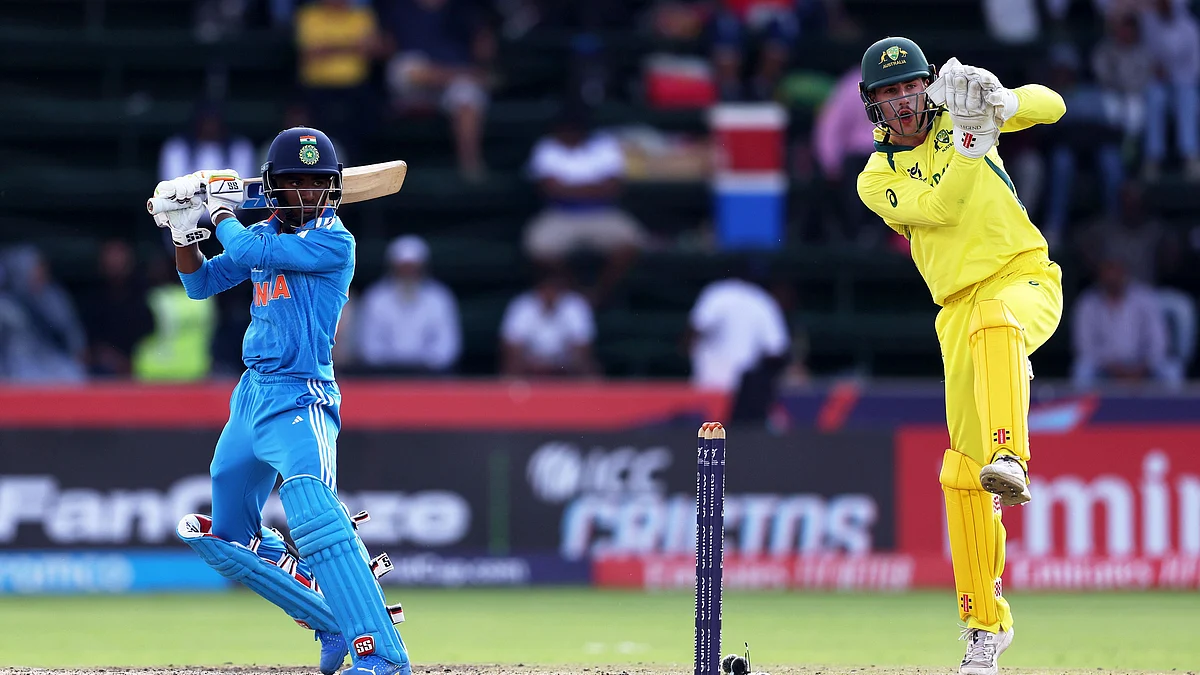U19 World Cup Final: India Falter at the Last Hurdle, Australia Win by 79 Runs
#U19WorldCup| Chasing a target of 254 runs, India were bowled out for 174.

advertisement
The final of a World Cup. Contesting for glory are India and Australia. India come into the match as favourites, having won all of their previous matches in the competition. Yet, the Aussies emerge victorious, disrupting the status quo with their audacious nonchalance. As if to say, cricket belongs to them.
So far, it might seem we are talking about the 2023 Cricket World Cup final, but instead of Ahmedabad’s Narendra Modi Stadium, this match was played in Benoni’s Willowmoore Park. And, the tournament was the 2024 ICC U19 World Cup, where India were beaten by 79 runs by Australia. Chasing a target of 254 runs, India were bowled out for 174.
Having lost a reliable batting pillar much earlier than ideal, Musheer Khan and Adarsh Singh opted to remain cautious. This resulted in a consistent rise in the asking rate, as India could score only 28 runs in the first ten overs.
The five-time champions’ troubles were compounded when Musheer ended up chopping a Mahli Beardman onto his stumps in the 13th over. The 18-year-old pacer from Western Australia then got the crucial wicket of India’s skipper, and the player of the match in the semi-final triumph against South Africa – Uday Saharan. Lured into a drive, Saharan gave a simple catch to his Australian counterpart, Hugh Weibgen, after scoring only 8 runs.
Although Adarsh Singh had held the fort from one end, none of the other Indian batters could provide him with company. Priyanshu Moliya struggled to score 9 runs in 20 deliveries, before being dismissed by Charlie Anderson in the 21st.
Having already struck gold by getting the wicket of Dhas, Raf MacMillan then added to his tally by dismissing Indian wicketkeeper-batter Aravelly Avanish Rao on a duck.
Now batting with the tail-enders, and effectively staring at calamity, Adarsh found himself with no other option but to slog. He was successful at first – hitting Vidler for a four and a six in consecutive deliveries, but only nine deliveries later, he found his nemesis in Mahli Beardman.
The Indian batters could not evade the revolving doors as Raj Limbani could survive only four Raf MacMillan deliveries, as the fifth one disturbed his stumps.
India, however, did not go down without a fight. Murugan Abhishek, the 19-year-old all-rounder from Hyderabad who had faced only 17 deliveries in this competition before the final, chose to step up when the stakes were at their highest.
The number 11 batter, Saumy Pandey's stay lasted only 13 deliveries before getting dismissed by Tom Straker.
India Retaliated With the Ball After Aggressive Aussie Start
Earlier in the day, Australia scored 253/4 after opting to bat first. The bold decision of batting first might have raised a few eyebrows, especially considering only a couple of teams have been successful in defending a total at Willowmoore Park. Albeit, the three-time champions wasted no time in justifying their choice.
In only the second bowler – bowled by India’s left-arm quick, Naman Tiwari – Australian opener Harry Dixon struck two fours and a maximum, clearly signalling their intent to exert scoreboard pressure on the Indians, who haven't been tested with a substantially big target in this competition.
Australia scored only 45 runs in the first ten overs, and the scoring rate dropped even further in the last ten overs, where they scored 42 runs. At the end of 20 overs, the score read 87/1.
Leading the Australian resilience was their skipper Hugh Weibgen, who had scored a stunning century against England. He was only a couple of runs shy of what would have been a commendable half-century when he was dismissed by Tiwari. Enticing Weibgen to a cover drive, Tiwari managed to find the outside edge which was safely caught by Musheer Khan.
With one established batter departed, India needed to dismiss the other set batter – Harry Dixon, who was holding firm on 42. Tiwari, who had been taken to the cleaners by the same batter, redeemed himself in the 23rd over by outfoxing Dixon with a knuckle-ball, which the 18-year-old guided into the hands of Murugan Abhishek.
ICC U19 World Cup Final 2024, India vs Australia: Naman Tiwari produced two quick breakthroughs.
(Photo: ICC)
Unlike the previous occasions, the fall of a wicket did not cause the scoring rate to take a nosedive this time. Harjas Singh – the powerful left-arm batter who was born and raised in Australia, but has roots in India – took the attack to the Indian off-spin pairing of Priyanshu Moliya and Murugan Abhishek.
ICC U19 World Cup Final 2024, India vs Australia: Raj Limbani picked up three wickets.
(Photo: ICC)
Following a theme similar to the dismissals of Weibgen and Dixon’s departures, one wicket brought another for the Indian team. Only three overs after Limbani sent Hicks packing, Saumy Pandey got Harjas Singh leg before wicket, who didn’t get any connection with the ball during his ill-fated slog sweep attempt. Raf MacMillan then lost his wicket to Musheer Khan just a couple of overs later. At the end of 40 overs, Australia’s score read 187/6.
The next five overs produced only 23 runs, but the momentum swayed in Australia’s favour in the 46th over. Raj Limbani conceded 13 runs in that over, though he did have the last laugh, dismissing Charlie Anderson.
The last four overs produced 30 runs.
(At The Quint, we question everything. Play an active role in shaping our journalism by becoming a member today.)